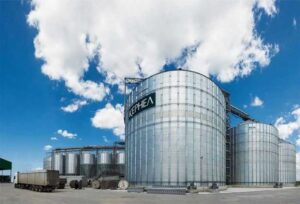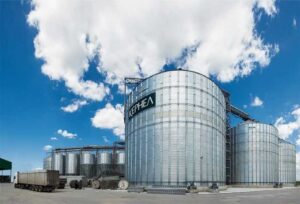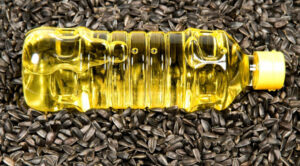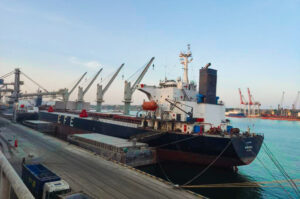
Kernel Agro Holding, one of the largest agricultural companies in Ukraine, processed 3.2 million tons of oilseeds in the fourth quarter of the 2023-2024 fiscal year (FY, July-June) and returned to pre-war processing volumes, the company’s press service reported in a preliminary public report.
“This result was achieved thanks to the commissioning of a new oil extraction plant in western Ukraine,” the press service explained on its Facebook page.
According to the report, Kernel transshipped 6.7 million tons of agricultural products through its terminals, including 486 thousand tons for partners.
In fiscal year 2024, the agricultural holding offered its port facilities to Ukrainian farmers for the first time to help increase Ukraine’s agricultural exports. This area will continue to develop, Kernel promised.
“We exported 5.5 million tons of grain, which is 47% more than in the last financial year. This became possible due to stable exports via the Black Sea,” the agricultural holding summarized.
Prior to the war, Kernel was the world’s leading producer of sunflower oil (about 7% of global production) and its exports (about 12%). It is one of the largest producers and sellers of bottled oil in Ukraine. In addition, it is engaged in the cultivation and sale of agricultural products.

Kernel Agro Holding, one of the largest agricultural companies in Ukraine, processed 951 thousand tons of oilseeds, including 17 thousand tons of rapeseed, in the fourth quarter of fiscal year (FY) 2024, bringing the total processing volume to 3.2 million tons in FY 2024.
“This represents an increase of 27% year-on-year, primarily due to new crushing capacity added in February 2024 and the commissioning of a new oil extraction plant in Western Ukraine,” the company explained in a report to the Warsaw Stock Exchange on Monday.
According to the report, sales of sunflower oil in April-June 2024 increased by 1% quarter-on-quarter to 384 thousand tons, including 20 thousand tons of bottled sunflower oil.
The volume of silo acceptance in the fourth quarter of FY2024 was seasonally low and amounted to 53 thsd tonnes, bringing the total production in FY2024 to 2.8 mln tonnes, which is the same as in the same period last year, the agroholding said.
At the same time, the volume of grain exports from Ukraine in the last quarter of the financial year amounted to 1.61 mln tonnes, 46% of which were to foreign buyers. This is 14% less than in the previous quarter, but 2.6 times more than in the same period last year.
“For the whole of fiscal year 2024, Kernel exported 5.5 million tons of grain, up 47% year-on-year. Grain received from external suppliers accounted for 2.6 million tons of the total export volume. The agricultural holding attributed this growth to well-functioning export routes through the Black Sea for most of the year.
In April-June 2024, the transshipment volume of the group’s export terminals decreased by 8% compared to the previous quarter and amounted to 2.3 mln tons, indicating a slowdown in grain exports.
For the whole of FY2024, Kernel transshipped 6.7 mln tons of grain, sunflower oil and meal through its terminals, up 51% year-on-year. This growth was driven by the resumption of export routes through deep-water ports starting in the second quarter of FY2024. Grain accounted for 75% of the total transshipment volume in FY2024, edible oil for 12%, and meal produced from residues.
To improve terminal capacity utilization, the Group provided transshipment services to third parties in FY2024, totaling 486 thousand tons.
“Critically high temperatures and prolonged lack of precipitation in all regions of the group’s presence negatively affected the yield potential of spring crops in the fields, especially soybeans and, to a lesser extent, corn,” the agricultural holding summarized.
Before the war, Kernel Agro Holding was the world’s leading producer of sunflower oil (about 7% of global production) and its exports (about 12%). It is one of the largest producers and sellers of bottled oil in Ukraine. In addition, it is engaged in the cultivation and sale of agricultural products.
Kernel’s net profit for FY2023 amounted to $299 million, while the company ended the previous year with a net loss of $41 million. The agricultural holding’s revenue for FY2023 decreased by 35% to $3.455 billion, but EBITDA increased 2.5 times to $544 million.
In the first half of FY2024, Kernel’s net profit fell 3.6 times compared to the first half of FY2023, to $102 million, and EBITDA halved to $223 million, with revenue down 16% to $1.59 billion.

“Kernel, one of the largest Ukrainian agricultural holdings, processed 816 thsd tonnes of sunflower seeds in the third quarter of fiscal year 2024 (FY, July 2023-June 2024), up 10% year-on-year and in line with the previous quarter.
“At the end of February, the Group launched a start-up initiative at a new oilseeds crushing plant located in western Ukraine, which crushed 24 thousand tons during the reporting period. At the time of publication of this report, the plant is reaching full production capacity,” the company said in a report to the Warsaw Stock Exchange on Wednesday.
According to the agroholding, two of Kernel’s oilseed processing plants in Kharkiv region are out of operation due to their proximity to the Russian border and the war zone. The assets continue to be subject to regular attacks and suffer serious damage. One of these plants is currently in an emergency condition due to its location in the epicenter of hostilities. Both assets were fully impaired in 2022.
At the same time, sales of sunflower oil in January-March 2024 increased by 40% compared to the same period in 2023 and reached 382 thousand tons, totaling 1,090 thousand tons in the first nine months of FY2024, up 33% year-on-year.
Sales of bottled sunflower oil accounted for 5% of total sales (19 thsd tonnes) in the third quarter of FY2024.
Although the profitability of sales was relatively stable in the third quarter of FY2024, compared to the previous quarter, EBITDA per tonne of oil sold decreased by 36% to $131, as the profit for the previous quarter was exceeded by a one-time insurance payment caused by material damage and business interruption.
As a result, EBITDA of the Sunflower Oil segment decreased by 34% to $50 million in the third quarter of fiscal year 2024 for the nine months ended March 31, 2024.
The Oilseeds Processing segment generated $184 million in EBITDA for the agricultural holding, down 16% year-on-year.
“As of March 31, 2024, Kernel had a relatively good supply of sunflower seeds: 511 thousand tons of seeds were in stock. Together with further purchases in April-May 2024, this will ensure that the agricultural holding’s plants will be operational until mid-summer, with a further switch to rapeseed processing at some plants, which was already practiced a year earlier.
“Following the progress of the processing season, we have revised our estimates of the sunflower harvest for 2023 and are increasing the harvest of seeds in Ukraine from 14 to 14.5 million tons,” Kernel said.
At the same time, since April 2024, the group’s enterprises have been experiencing problems with electricity supply caused by Russia’s attacks on Ukraine’s generating and distribution infrastructure. This has led to increased downtime and reduced productivity, although the impact is still manageable, the agricultural holding explained.
“Kernel also said that in June-July 2024, it plans to commission a sixth cogeneration thermal power plant with an installed electric capacity of 22.5 MW as a generating capacity at its recently launched oilseed processing plant in western Ukraine.
“This renewable energy capacity is of great importance, especially given the plant’s planned capacity and the upcoming power outages in Ukraine in the fall and winter of 2024,” Kernel emphasized.

In the first nine months of the 2023-2024 marketing year (MY), Kernel Agro Holding exported 1 million tons of sunflower oil in bulk to almost 30 countries, the company’s press service reported on Facebook.
“We remain the largest agricultural exporter of sunflower oil and are among the TOP-3 total exports of Ukraine,” the statement said.
According to the agroholding, about 50% of the total volume of sunflower oil was supplied to India, 8% to the UAE, 7% to China and Spain, 5% to Italy, and 2% to Iraq, Singapore, Switzerland, Turkey, and Hong Kong.
“To expand the export opportunities of the entire industry, last year we started offering our infrastructure capacities to other agricultural producers in the market. At the company’s terminals in Odesa region, we provide transshipment services for grain crops and vegetable oil,” Kernel said.
In addition, the agricultural holding is completing the construction of one of the largest oil extraction plants in Europe in Starokonstantinov, Khmelnytsky region. Its processing capacity will be 1 million tons of seeds per year.
“This will allow us to increase the export of vegetable oil, a value-added product, and support agricultural producers in the region by providing them with opportunities to sell their products,” the agricultural holding explained.
As reported, Kernel processed 816 thsd tonnes of sunflower seeds in the third quarter of fiscal year (FY) 2024, up 10% year-on-year.
At the same time, sales of sunflower oil in January-March 2024 increased by 44% year-on-year to 394 thsd tonnes, totaling 1,103 thsd tonnes in the first nine months of 2024.
Before the war, Kernel Agro Holding was the world’s leading producer of sunflower oil (approximately 7% of global production) and its exports (approximately 12%). It is one of the largest producers and sellers of bottled oil in Ukraine. In addition, it is engaged in the cultivation and sale of agricultural products.
Kernel’s net profit for FY2023 amounted to $299 million, while the company ended the previous year with a net loss of $41 million. The agricultural holding’s revenue for FY2023 decreased by 35% to $3.455 billion, but EBITDA increased 2.5 times to $544 million.
In the first half of FY2024, Kernel’s net profit fell 3.6 times compared to the first half of FY2023, to $102 million, and EBITDA halved to $223 million, with revenue down 16% to $1.59 billion.

In the third quarter of fiscal year 2024, Kernel processed 816 thousand tons of sunflower seeds, up 10% year-on-year.
According to the company’s announcement on the Warsaw Stock Exchange on Tuesday, six crushing plants of the agricultural holding operated at almost full capacity, while two plants were idle due to the proximity to the Russian border and the war zone.
In addition, at the end of February, Kernel started commissioning the Starokonstantinovka oilseed processing plant in Khmelnytsky region. At the time of writing, the plant has reached over 90% of its processing capacity at the commissioning stage. The plant is expected to be fully operational by May 2024 and reach its maximum processing capacity of 1 million tons of sunflower seeds annually.
At the same time, sales of sunflower oil in January-March 2024 increased by 44% year-on-year to 394 thsd tonnes, totaling 1,103 thsd tonnes in 9M2024.
Sales of bottled sunflower oil in the third quarter of FY2024 amounted to 5% of total sales (19 thousand tons).
Kernel emphasized that the volume of loading of the group’s granaries in the third quarter of fiscal year 2024 was at a seasonally low level – 254 thousand tons, which amounted to 2.7 million tons for 9 months of fiscal year 2024, which corresponds to the same period last year.
The export terminal’s transshipment volume for the reporting period increased to 2,464 thsd tonnes of grain, sunflower oil and meal, which showed a 2.3-fold increase. This was driven by consistent export activity via the Black Sea, increased volumes of sunflower oil produced, transshipment through port terminals acquired earlier in the season, along with the provision of transshipment services to third parties.
Despite the high transshipment volumes of the terminals, the volume of grain exports from Ukraine in January-March amounted to 1.877 thousand tons, which is 2.3 times more than in the same period last year, the company stated.
Before the war, Kernel Agro Holding was the world’s leading producer of sunflower oil (approximately 7% of global production) and its exports (approximately 12%). It is one of the largest producers and sellers of bottled oil in Ukraine. In addition, it is engaged in the cultivation and sale of agricultural products.
Kernel’s net profit for FY2023 amounted to $299 million, while the company ended the previous year with a net loss of $41 million. The agricultural holding’s revenue for FY2023 decreased by 35% to $3.455 billion, but EBITDA increased 2.5 times to $544 million.
In the first half of FY2024, Kernel’s net profit fell 3.6 times compared to the first half of FY2023, to $102 million, and EBITDA halved to $223 million, with revenue down 16% to $1.59 billion.

“Kernel, one of Ukraine’s largest agricultural groups, has purchased a third vessel for grain exports with a carrying capacity of more than 50,000 tons, the agricultural holding’s press service reports on Facebook.
“We have purchased a new vessel Rotterdam Pearl V, capable of exporting more than 50 thousand tons of grain. Now our fleet already includes three vessels that can export about 100 thousand tons of grain and 20 thousand tons of sunflower oil per month,” the statement said.
The company added that it continues to invest in expanding maritime logistics capabilities for the Ukrainian agricultural industry.
“Our own fleet has been providing Ukrainian exports to the Mediterranean and North-East Atlantic countries for more than a year and allows us to manage costs along the entire logistics chain. The development of our own shipping, in particular, does not force us to fix tonnage from the market, which is unprofitable during the period of inflated freight rates during martial law,” the statement said.
Before the war, Kernel Agro Holding was the world’s leading producer of sunflower oil (about 7% of global production) and its exports (about 12%). It is one of the largest producers and sellers of bottled oil in Ukraine. In addition, it is engaged in the cultivation and sale of agricultural products.
Kernel’s net profit for FY2023 amounted to $299 million, while the company ended the previous year with a net loss of $41 million. The agricultural holding’s revenue for FY2023 decreased by 35% to $3.455 billion, but EBITDA increased 2.5 times to $544 million.